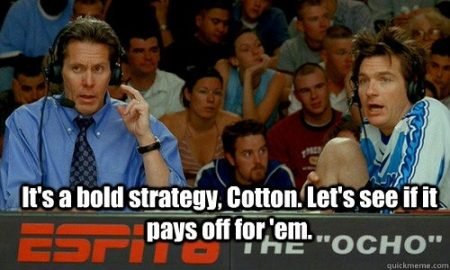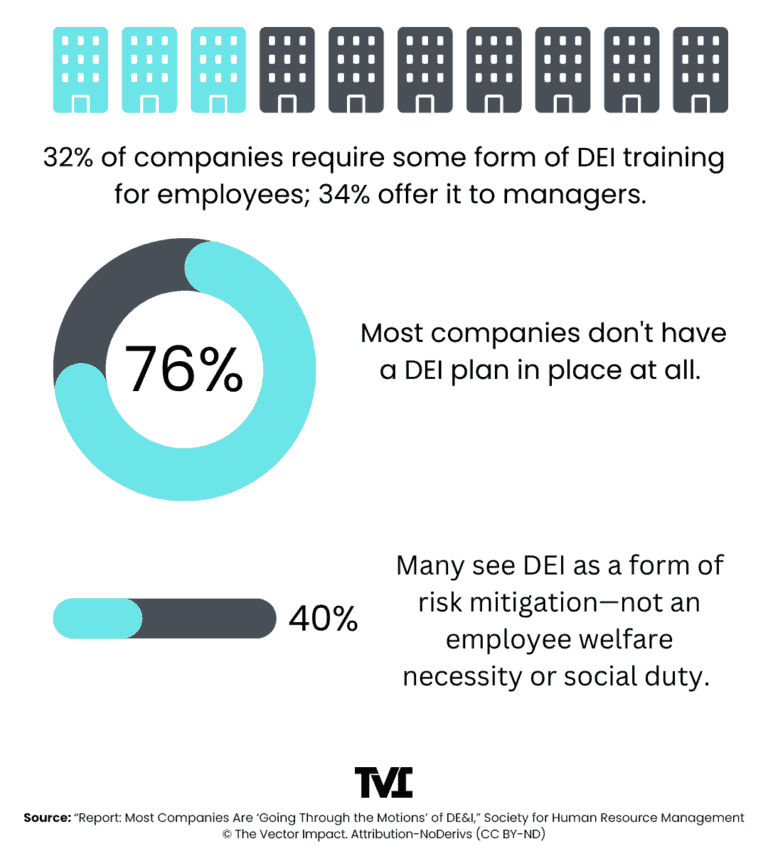Thousands of laid-off workers entering the job market and a general sense of wavering job security/satisfaction have made this topic a recent buzz in my social circles. My satirical cover letter from last week could use some supplemental earnest discussion too.
Deception at work is the norm. It’s depressingly widespread, even at companies flying “We pride ourselves on diversity” banners. Lying is embedded so deeply that we get rejected or mocked if we don’t participate.
It’s rarely spoken in public forums — only “be yourself” and “honesty is the best policy” articles churned out by recruiters and HR reps there.
But I’ve had hundreds of private conversations with mentors, colleagues, and recruiters alike who advise the opposite.
Are you sure you want to put your pronouns on your cover letter?
a recent conversation
What’s an outspoken advocate of vulnerability and transparency to do?
Balancing Opportunity Costs
Despite widespread social biases against the queer and neurodivergent, I have some advantages:
- I work in a high-demand field.
- My skills are highly transferrable.
- I’ve built a strong reputation among my network.
- I live in a prime location for my field, and can work fully-remote at maximum efficiency.
- Every industry on Earth has use for my skills, so I’m not stuck bouncing around a handful of companies who can price fix my salary or blackball me.
- No matter what clickbait ChapGPT headlines say, my job will never be effectively automated. It’s always been part of the gig to automate my tasks to maximize impact anyway.

Recruiters are in my DMs every day, so I have the privilege of being fairly selective. I recognize most workers can’t do this, but that makes it even more important to leverage my skills and experience into more people like me being welcomed, accepted, and enabled in the workforce.
My 🏳️⚧️🏳️🌈 emojis and #actuallyAutistic hashtags certainly repelled a few opportunities, but I view it as self-selection.
Filtering

If a hiring manager rejects me based on my gender identity or expression, their organization isn’t a safe place to work. I’m not interested in putting on a conforming social performance at work. It’s an uncomfortable distraction from being effective at my job.
If my ADHD, depression, or autism affects decisions about my employment, they’re discriminating against the disabled. These traits are common and a significant portion of any workforce’s strongest performers likely bear at least one. Demanding we hide all day in addition to our official duties is abusive and wasteful.
If my outspoken transparency or the vigor with which I write is a problem for them, then my kind candor in work communication won’t be welcome either. Leaders who fear honest communication and can’t embody it themselves can’t help me thrive and grow. Companies hiring and promoting obsequious managers are bad investments of time, talent, effort, and money.
Choosing these petty priorities over effective work performance is a red flag: this company is bound for failure. Failure may come slow enough to outlast my career, but I still prefer to work where long-term sustainability is valued.

Diversity
Employers are required to gather identity labels from applicants and employees willing to divulge them. I fill these forms out accurately and likewise encourage others. The ACLU, Department of Justice, and other advocates for civil rights need evidence to fight for marginalized people. While hiring managers continue to discriminate based on assumptions from our names, explicitly telling them these details makes it harder for them to pretend they aren’t.
Employers market themselves with our stats. Each June, rainbow-washed logos enshroud parade floats and inclusion stats grace PR wire headlines for the first time since the previous year. Every February and MLK Day, nearly-all-white boardrooms and executive teams re-state intentions to hire and promote more black folks — a seemingly perpetual work-in-progress. March 8th heralds a few proud declarations of paying women decently while most keep carefully quiet.
Companies with DEI (Diversity, Equity, and Inclusion) teams tend to do better, but not always.

Marginalized employees’ identities are played for PR, so we may as well get something out of it. We’re providing our employers opportunities to be better at their stated goals. Hiring and compensating us fairly for these additional bonuses we bring to their workforce is simply good business.
How I’m Out
My pronouns are on my Zoom profile, my email signatures, and every profile Gap Inc. maintains. My boss rarely gets them right, but assures me he’s trying. Others I collaborate with regularly picked them up at a reasonable pace. My favorites got them almost immediately — funny how that works out.
I dress however I want each day, which occasionally leans femme. My brightly-colored hair and peeks of my tattoos are generally visible, even as a remote worker over Zoom. I stopped muting my mannerisms in all circumstances from the day I came out publicly, so I talk and move freely.
I’m an outspoken member of the PRIDE@GapInc organization. Corporate culture internally hasn’t shifted much since I arrived here regarding LGBTQIA+ issues, but we do some good externally and having a group to vent and find support from when the headlines are horrible has been nice.
I mention my mental health conditions when they’re relevant. Stephen “Twitch” Boss — a dance, music, and style celebrity — is one of the faces of a campaign we’ve been producing for the end of this month. He recently committed suicide and we had conversations about how to approach our near-finished campaign. My experience with depression came up in my recommendations in those meetings.

I never know the weight of my influence on the hearts and minds of our CMO, designers, copy writers, and producers (they’ve certainly ignored my vigorous dissent over Kanye and NFTs), but the campaign we ended up with this time feels pretty tasteful to me. (It comes out on 1/31 if you want to look for it)
I advocate for autistic workers and reveal my spectrum status as needed, though it’s hard to do without an org like PRIDE@GapInc. We’ve discussed creating one, but a few key members got laid off recently, so the project is backlogged for now.
As I’ve mentioned in previous posts, I speak openly about suffering from chronic pain and using marijuana to medicate it. But I still don’t use my medication during business hours, despite the boon it could be on hard days.
Readers probably gleaned by now: Gap is a great place to work most of the time, but that isn't the intended topic of this article. American workplaces in general have many areas where even the best need to do better.
Stuff I Don’t Bring Up
Shame isn’t really in my repertoire. My dirty laundry flutters in the breeze wherever I go. That said, there’s any number of reasons I may choose not to divulge something at work:
- It’s not relevant to my workflow.
- It’s an invisible trait I don’t need to spend any effort concealing.
- I’m not close enough with others in the room to invite them to that part of my life (a boundary I hold with personal relationships as well).
- I don’t presently feel like spending time and effort explaining it.
When a coworker asks how my weekend was, I’ll tell them I went on a trip with my partner, but I won’t mention us being poly or queer unless I’m close with that colleague and it’s relevant to the conversation.
When someone asks me for details involving protected characteristics, my response is usually
Let’s grab a coffee/drink sometime and I’ll dish. 😉
Identity 101 stuff (labels, pronouns) are fine in the office, but details are for after-hours, at least the first time I discuss them. This is also a quick and easy test to see how respectful folks are of boundaries.
It’s hard to make friends as an adult, and I genuinely like many of my colleagues and consider them friends. I want them to know I welcome their interest and would be happy to build and nurture our friendship.
I’ve been betrayed by coworkers.
At SparkPost (now MessageBird, previously Message Systems), a colleague told my boss things I said when we were commiserating at a bar after work once. Standard “this guy doesn’t understand what we do” type stuff. Everyone was bitching about work, including her, but she apparently felt it would help her in her budding career there to rat me and a few others out. At least two of us received verbal discipline and performed a customary disingenuous supplication ceremony for the manager.
My friendship with them ended immediately. At the office, I treated her with the absolute minimum civility for which I had capacity.
I hated the ways that experience changed me. I held everyone at work at strict distance for a couple years. Work is alienating and uncomfortable enough, and this made it worse.
I rolled it back. Like the self-work we do to trust new partners after being cheated on, I grew to believe it was better to have friended and lost than to never have friended at all. Now I let friendships with colleagues develop naturally, and I share personal details as we get close enough for it to feel right.
Discretion is often pointless anyway.
Because my healthcare is conditionally tied to my employment, I must divulge information about my orientation, gender transition, and family-planning to at least a few colleagues. I wish this wasn’t the case, but universal healthcare only seems possible for better countries than mine.
I’ve had to divulge sensitive personal health and relationship information to strangers in HR departments over the years to get access to benefits I need. HR staff tends to rotate every 6-12 months and I know how not-great big companies (especially HR departments) are at data security, so I assume my business is out there in the bubbles who determine if I’m getting laid off this week or not anyway. No one can learn things about a person and truly disregard information when making decisions, no matter how television judges and juries act.
So I may as well just not lie, even if everyone else is lying.
Right is right,
Juliette Gordon Low
even if no one else does it.
I count survival among my accomplishments.
Part of introducing ourselves to new people, whether it be for an opportunity or a friendship, is the confidence and knowledge we carry from what we’ve already done. I bring my whole self to work and my employer benefits from every part of me.
My scars are the corpses of things that failed to kill me; they’re pike-mounted heads outside my open castle gates. I wear them unabashedly. Stupid things I thought when I was younger, awkward experiments, lessons I learned the hard way, and after-the-fact I told you so‘s I strain to keep inside supplement my resume. All of it is relevant experience.
Living openly and vulnerably is a strength. I seek and surround myself with strong people. I won’t settle for less.
